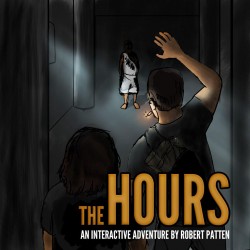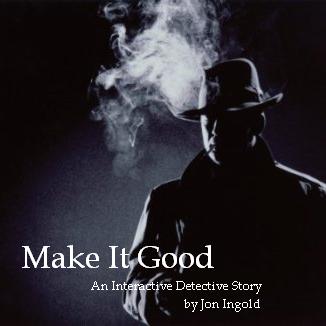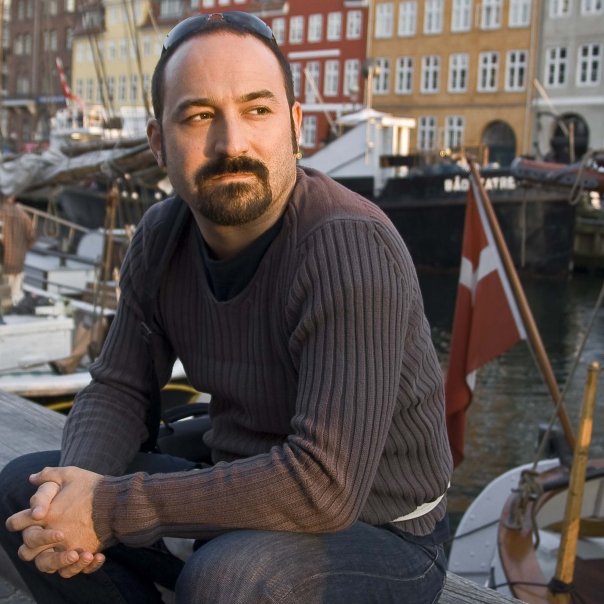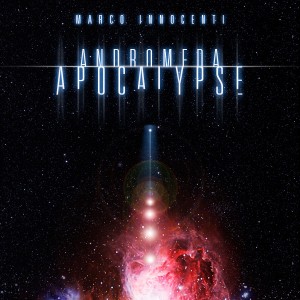Eurydice, a meditation on grief that juxtaposes Greek myth with a lovingly observed contemporary setting, took second place in the eighteenth annual IF Competition. Its author, who asked to remain anonymous, agreed to answer some of our questions.
Sam Kabo Ashwell: Why IF? What made you choose this strange little medium rather than straight prose or CYOA or postmodern folk dance?
It was, in all honesty, partly ignorance. Well, that and being quite poor at postmodern folk dance. I wouldn’t hold it up as a beacon of good practice, but there can be something quite liberating about not really knowing what you’re doing because it encourages you to just jump in and go for it.
I’m actually finding it really difficult to look back and interrogate my own motivations. Writing Eurydice was such a process that I almost think the person who began working on it isn’t the same person who’s trying to talk about it now. I do know, however, I had absolutely no interest in writing straight prose. Like the world really needs another emo short story about a dead girl. Although I suppose that leaves the question of whether the world needs a piece of emo IF about a dead girl. But, y’know. To be stop being self-conscious about it for a fleeting moment, I think that’s part of the reason I wanted to work within an interactive framework. Grief is simultaneously solipsistic and universal, and there was something quite meaningful to me about a text that developed from that contradiction. More generally, I’ve played a fair bit of IF and I’ve always had a vague intention to try and write some, but I suppose having something I felt impelled to write about finally crystallised intent into action.
 The other thing, I guess, and I apologise in advance if this sounds horribly self-important, but one of the things I’ve always found striking about certain depictions of grief is the way the writers seem to have deliberately sought out demanding forms as the vehicle for their expression. ‘Do Not Go Gentle Into That Good Night‘, for example, is a villanelle – a form so rigid and awkward to use that I can only think of about five good ones in the English language, and mainly they’re exercises in technique rather than emotion. So there’s something quite stunning, I think, about that poem because the content and the form are at such terrible variance: so much pain, anger and despair, shining – fly in amber style – through the restrictions of the chosen medium. Similarly, Tennyson’s ‘In Memoriam‘ has an incredibly fixed rhyme and stanza structure, even for Victorian poetry. To me, the very neatness of it, the bouncy-bouncy rhythm and the apparent simplicity of the rhymes, only centralises the stark, unanswerable questions about the nature of grief, loss and divine love (whether or not you think this has been plausibly resolved into “yay god!” by the end).
The other thing, I guess, and I apologise in advance if this sounds horribly self-important, but one of the things I’ve always found striking about certain depictions of grief is the way the writers seem to have deliberately sought out demanding forms as the vehicle for their expression. ‘Do Not Go Gentle Into That Good Night‘, for example, is a villanelle – a form so rigid and awkward to use that I can only think of about five good ones in the English language, and mainly they’re exercises in technique rather than emotion. So there’s something quite stunning, I think, about that poem because the content and the form are at such terrible variance: so much pain, anger and despair, shining – fly in amber style – through the restrictions of the chosen medium. Similarly, Tennyson’s ‘In Memoriam‘ has an incredibly fixed rhyme and stanza structure, even for Victorian poetry. To me, the very neatness of it, the bouncy-bouncy rhythm and the apparent simplicity of the rhymes, only centralises the stark, unanswerable questions about the nature of grief, loss and divine love (whether or not you think this has been plausibly resolved into “yay god!” by the end).
And, obviously, I’m not trying to say I totally decided to make like Dylan Thomas by writing in Inform 7 instead of on a piece of paper, but I think there is value is bringing intellect to emotion (also I’m frankly a lot more comfortable with the first than the second). And Inform 7 is not remotely comparable to a villanelle, because it makes a lot more sense, but there’s something quite comforting in … actually I think I’ve come back to Tennyson: “But, for the unquiet heart and brain / A use in measured language lies.” Or, in my case, natural language.
So, I think what I’m saying in a massively long-winded way is that, from both a personal and a creative perspective, it’s useful to act and think against the grain of grief, and it also obliges you to present that grief in a form that could conceivably engage someone else – whereas an unstructured burble of pain has no value to anyone, except possibly a Kleenex.
How was your Comp experience?
To be honest, I didn’t really have a comp experience per se because, once I stuck Eurydice into the competition, I thought the most sensible thing I could do was keep the heck out of the way. Of course, I played the other games and that was fascinating and humbling all at once. And also a bit terrifying because the competition, by necessity, requires you to view everything comparatively and that’s basically like sitting there going “Well, do I think this live salmon is better or worse than this deck chair.”
I’m also just … um … kind of stunned that I came second. I’m very aware that it was a bit of a polarising game and, being a first effort, flawed in many ways (also my proof reading is the suck), so I’m incredibly touched by the kindness of people. And also because it was a pretty grim subject, I was glad (and wildly relieved) that I’d managed to present it in a fashion that some people were able to get something out of. Rather than just making everyone miserable for no clear reason.
Now that it’s over, I’m slowly working my way through transcripts and reviews – which, once again, leaves me all flustered and grateful, since it’s like … wow, not only did these people take the time to play the game, but they’re also taking the time to say insightful, articulate and useful things about it (and occasionally really lovely things, too). A couple of people even took the trouble and time to send me their annotated transcripts and suggestions, which was so above and beyond the call of duty it bowled me over.
Of course, it can also sometimes be difficult to read very negative reviews but, ultimately, if you put something in the public domain then anyone has the right to really hate it. And, to be honest, once I’ve got over the instinctive ouch response, it just makes me feel like I wrecked some poor stranger’s day. I’ve generally avoided discussion, not because I don’t give a toss, but because I suspect it would really easy to turn into a raging auteur. At the time, I thought I had what were perfectly sensible rationales for making the choices I did (I’m talking holistically here, I did not at any point in the design process make a rational choice to proof read the game badly) but they’re pretty irrelevant both to the player’s interpretation of the text and whether or not it was an effective game for them.
So what I’m (again, long-windedly) getting at is that my competition experience, even from a distance, has been extremely positive.
If you could go back to the start of the project, would you approach anything differently? Where do you most want to improve as an author?
Yeesh. There’s tonnes. There are a bunch of niggling things (which I’ll hopefully fix as best I can in the post-competition release), for example I’d try to be a little less purple in my prose, I’d proof-read way better and I’d try to be less self-conscious and awkward in the meta text. I’d like to neaten things up across the board, like sort out the way the room names are printed, implement a few more custom responses, and sort out the naming of the mythological characters, even though it’s blatantly obvious who they are anyway. More drastically, if I really was back to the drawing board, I’d pay a bit more attention to the actual mechanics of the game as a whole – as Emily Short pointed out in her review, the hidden-objecty-ness sits quite awkwardly with the ‘art game art’ feel, and is incredibly obscurely implemented. In the more general sense, I really need to be better at using Inform 7. You can get to a certain level of base competence just by flailing around but to actually use it to its full potential takes … actual work and, y’know, ability.
Also I should have really implemented something to let the player hug Celine. I mean, that was a pretty darn serious oversight. What kind of monster am I?
From the perspective of a first-time author, what is community support getting right and what could do with improvement? Could the IF community be doing more for new authors?
I didn’t really use the community as much as I could have / should have when I was writing Eurydice, which probably explains (a bit) how rough it is in places. I brute forced and make-shifted a lot of my coding, because it genuinely hadn’t occurred to me to ask for help. I feel a bit bad for Inform 7, actually, because the whole experience was a bit HULK WRITE SAD TEXT ADVENTURE BADLY SMASH.
In terms of working with Inform, though, the scope of the documentation is, just on its own terms, amazing. I mean, even if the super-extensive and remarkably entertaining manual isn’t doing it for you, chances are somebody, with a completely different style and approach, has written something on the subject as well. Or someone else has already asked the question, and received a million answers, on a forum somewhere. So in terms of providing resources the community is tremendous. I’ve had significantly less experience with, um, interacting with Real Humans. But everyone I’ve spoken with has been kind and helpful – but, then, that’s a self-selecting sample, and you’d have to be a pretty serious level of annoyed with me to actively get in touch to tell me how badly I wrecked your day.
A lot of reviews talked about how they really liked the depiction of the housemates, and Persephone; but the story ultimately occupies this very traditional IF space where the protagonist is very isolated. What sort of games would you be making if NPCs magically became easy?
I’m really glad the depiction of the housemates came across well to some people – it was a way, at least, of injecting a little energy and amusement into the proceedings. (Also churlish bitterness – I’m quite pleased at how many attempts there were to kill Laurie). As I said earlier, grief can be a very isolating experience so, in that respect, I was deliberately trying to create a world that felt, um, emptily full of people. In an earlier version of the game, I did actually have a full conversation system implemented, so you could do the whole TALK TO and ASK ABOUT and TALK ABOUT thing, but I stripped it right back and replaced it with TALK TO because I actively wanted something in which the interaction felt very shallow, limited and static. So, even if NPCs had been easier to implement, I wouldn’t have done anything different in Eurydice. As for actually answering the question (sorry), I honestly haven’t really considered it. I’m still a bit dazed about having managed to write one piece of IF to really be able to get my head round the possibilities of trying to write more.
Eurydice is about mourning, about the progress of a single emotional state. It’s abundantly clear from the outset that you’re pursuing a doomed cause. What’s it like to work on a piece like that, particularly a mid-sized game that isn’t going to be finished in a hurry?
Looking back at it, I’m slightly bewildered that I did it. But, at the time, it didn’t feel like a big deal – it just happened to be what I was working on. It was quite an emotional experience but I actually found it quite cathartic. Expressing everything that – at the time – felt inexpressible. And just to be excruciatingly honest for a moment: I was in a bad place in my life and couldn’t bear to be around people, so what else was I going to do with my time?
Are there any works — IF or otherwise — that you can point to and say, without this Eurydice wouldn’t have happened?
I’ve played quite a lot of IF but I can’t really claim any direct influences because we come back to the salmon and the deckchair problem. Also a lot of the IF I really admire is so beyond anything I could actually accomplish that it would feel sort of hubristic.
I’ve already burbled on about quite a bit about poetry, but Eurydice does open with a quote from ‘In Memoriam’, so I should probably stand up and admit that it was a hugely important text for me. It’s a bit random, to be honest, because it’s very much a Sad Victorian Is Sad And Worried About God kind of poem. And it should probably only have a limited amount to say to a 21st century atheist with a completely different worldview. But, although I don’t entirely buy the comfortable re-establishment of faith and order the poet gruellingly forces himself towards, there’s something I find exceptionally comforting about the sections where he’s basically going “omg, what does this mean, this totally sucks and I hate everyone, and nobody understands, and I’m miserable all the time and maybe I’ll just stand outside his house crying and being really creepy.” Except, y’know, in iambic tetrameter. I feel sort of the same way about C. S. Lewis’s A Grief Observed. Not a big fan of the consolation, but strangely cheered by the anguish, the railing and the despair.
As I keep saying there is (or can be) something intensely isolating and dehumanising about grief. For starters, we all experience and express it differently. But, let’s face it, there’s nothing quite as awkward or antisocial as someone in pain – there’s even something about it ‘In Memoriam’, when T makes a throwaway reference to the fact his friends and family want him to get over his grief because it’s gone on for ages and he’s making everyone uncomfortable. And I remember reading that and feeling, in some strange way, deeply moved and grateful that there was some Victorian fellow out there who was just as alienated and annoyed as I was. Stumbling across these moments, in ‘In Memoriam’, Birthday Letters and A Grief Observed were like threads connecting me back to the world, making me human again.
Sorry to turn this into quote soup, but there’s a bit in The History Boys, where Hector says something like: “the best moments in reading are when you come across something … which you had thought special and particular to you. And now, here it is, set down by someone else … and it is as if a hand has come out, and taken yours.”
And, in a way, and without indulging in delusions of grandeur, I would very much like to hope that perhaps Eurydice could be like that for someone else. I don’t mean to overreach but it’s, I don’t know, meaningful to me to think that perhaps texts can be a chain of connections between people. Though, of course, that doesn’t mean it’s a cruel or ignorant rejection if someone doesn’t like it, or that they spat in the outstretched hand or cut it off with a kitchen knife. The things that speak to us at certain times are entirely personal, and utterly diverse, and that’s the way it should be.
The endings seem partially structured around the classic Kübler-Ross stages of grief; was this originally conceived of as a more prominent element? To read things naively for a minute, how much is the central message of Eurydice “fantasy is a form of denial”?
I know there are shifting moods of depression, anger, denial and what-have-you in the game, and that the central journey seems to be a move towards acceptance of a kind, but I wasn’t specifically trying to reference the K-R stages of grief.
Although I’m sure it can be a useful model or some people, I often find that it gets applied in a slightly unhelpful way. It’s not like you start out as Level One Griever in Denial and gradually work your way up to Level Five, where you accept that your princess is in another castle and you’re never going to see her again, ever. I think K-R originally proposed the model, not as ‘stages’ exactly but as elements of the landscape of personal grief – so more of a sandbox, really, where you can do the missions in any order, repeat certain levels or skip others altogether. However, because the K-L thingy is practically part of our cultural consciousness now, I think when you look back on your own grieving process, you tend to start fitting your behaviour into the prescribed patterns because it’s simply human nature to want to find meaning in activities that may, or may not, have been pretty abstract and meaningless: “Ah, yes, when I pulled all my bookshelves down, I was experiencing Anger and then when I cried in the shower I was experiencing Depression.” When, actually, it’s probably a lot more random and complicated than that.
I think ‘fantasy is a form of denial’ could be a message you could choose to read out of Eurydice. Ultimately, what you want to take away is up to you. But, I suppose, for me, the cornerstone of grief is its finality. It’s been a while now but my rational mind still flinches from it. It’s very strange. I mean obviously I know, and I understand, that dead people are dead, and that’s that. But I can’t really meaningfully encompass the enormity of the unchanging truth that I will never see Celine again. That every year I am alive is a year she will still be dead. Perhaps it’s easier if you have faith in life after death. I don’t know. But, for me (and I know keep saying ‘for me’ but I want to emphasise that it’s just a personal reading and other readings are equally legitimate, I’m not trying to make blanket statements about grief or texts or life) it was less about fantasy versus reality, denial versus acceptance than that central question: how do you understand the foreverness of loss?
And, for me, the ‘Fable’ ending, where you sort of merge into the mythology while at the same time diverging from it, was about simply not being ready to deal with that foreverness rather than actively failing to deal with it, if that distinction makes sense. I know it’s not entirely supported by the game mechanics (which is my mistake as a noob) because ‘Fable’ is easier to get than, say, ‘Flowers’, so it feels like it might be a Bad Ending, but I didn’t particularly see it that way. I wasn’t trying to propose a right way or a wrong way to do grief. I’m not sure, but I think people thought the mechanics were less forgiving than they actually were – it was more about balance than having to go all out in one direction. So, yes, if you embrace all the mythology stuff then you’ll end up with ‘Fable’ but you can still get ‘Flowers’ without having to find every irritating hidden object.
Beyond straightforward milieu stuff, the protagonist of Eurydice is heavily ambiguous — a number of people felt they were female, and I got the impression of intentional ambiguous-gender and was surprised when I found something that seemed to make them explicitly male. Gender aside, it’s a piece that keeps a lot of information from the player, while doing very strong work with suggestive detail. What was the scheme here? How do you judge how much information the player should be given?
Yeah, that thing that seemed to gender the protagonist was me messing up, and I’ll be changing it. I did start Eurydice as a personal project but then, the more I wrote and the more my own emotional state changed and developed over time, I found myself moving from the specific to the universal. And it got to the point that I realised that I didn’t want the player to be limited by my identity, my experiences and perceptions, and my relationship with Celine. I know the lack of definition for the protagonist annoyed some people but, for me, it became very important that the protagonist could be of any gender, and that they could build their own relationship with Celine out of the spaces in the text, friends, lovers, ex-lovers, unrequited love, whatever you wanted.
Having a ‘scheme’ suggests I knew what I was doing but for the most part I was just going with ‘what felt right’. Not so much information that it limited the player into being a certain type of person (i.e. me) but enough so that they could establish their own coherent and meaningful reality out the patchwork of memories, experiences and details given by the game. I mean, I don’t know, but I think (I hope) you could see and interpret things quite differently depending on who you talked to or what you engaged with. Truthfully, I need to do more of this, as there were quite a few things that people wanted to interact with it that I’d completely failed to implement. And lots of them were things that made me go slightly smooshy to be honest, like wanting to give Celine a coat, which suggested perhaps that some players had genuinely come to care about her and want to help her. Which, in turn, makes me feel like she isn’t completely gone. Ahem. Smoosh.
What was most interesting about Parchment transcripts? Did people generally play as you expected?
I’m still analysing them, to be honest, prior to starting working on my post-competition release. They’re incredibly useful and, oh my God, are they fascinating, or what? I mean, I cringe every time someone bangs up against a limitation of the game or an overly florid phrase or a typo, which means I’m cringing a lot. But at the same time I’m tentatively pleased that Eurydice is just about still standing, despite the variety in approaches, which suggests I haven’t done everything entirely wrong. I tried not to write the game with too inflexible an expectation of how the player would behave (I don’t know how well I succeeded) and it’s interesting to watch someone approach things in a manner wildly different to anything you’d previously considered. But it’s also really nice, sometimes, to see someone playing in a way that suggests they’re thinking about it much as I was when I was writing it. Which brings me back to the idea of texts as way of reaching out to each other. Which isn’t a bad place to end. So I’ll leave it there.






